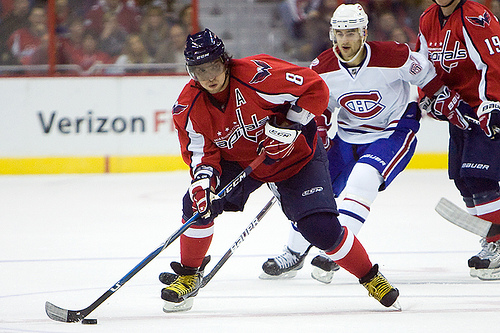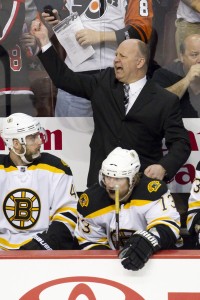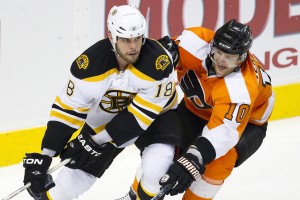
The second-seed Boston Bruins will face off against the seventh-seed Washington Capitals tomorrow in TD Garden. The Northeast Division champs lost three of four to the Caps during the regular season but hope to use their home ice in this first-round contest to springboard them into a successful defense of their title.
After discussing the B’s and Caps’ shared history on Sunday in Part I, demonstrating the significant (at least on-paper) advantage for Boston at even-strength Monday in Part II, and yesterday examining the special-teams and goaltending matchups in Part III; today we’ll analyze the intangibles (coaching, toughness, etc.,), injuries and take a look at some of the key players in the series.
Coaching

The Coaching matchup favors Boston purely on experience. Dale Hunter was a Stanley Cup finalist as a player but this is his first season as a NHL coach (head or otherwise) after ten-plus seasons as the bench-boss in London with the OHL’s Knights (who he led to six division titles and one Memorial Cup).
Claude Julien, on the other hand, will be coaching in his fifth straight postseason and sixth overall. Julien has consistently found success getting the matchup he wants on the ice. He has the respect of his players’ and faith (almost to a fault) in his game-plan and his team’s ability to execute it.
Julien is a line-matching specialist who will undoubtedly be working diligently to maintain the right combination of players to match up against the Caps top lines.
Hunter’s first partial-year has been a modest success (with a 30-23-7 record, it certainly hasn’t been the stark turnaround that Caps’ management envisioned when they hired him in November) but in coaching, experience wins.
Moderate Advantage: Boston
Team Toughness
The Bruins earn considerable accolades for ‘team toughness’. The Bruins finished second in fighting majors (61) while the Caps ended in twenty-sixth (with 26). The B’s arguably have the intimidation edge over every team in the League thanks to guys like Milan Lucic and Zdeno Chara – two of the toughest and meanest hombres in the League.
Realistically, you’d be hard-pressed to find a squad with more willing combatants than the B’s. The Caps have some decent bangers who are more than game and will stand up for themselves or teammates, but as a whole, Washington can’t hang with the B’s on this one. Some Caps fans will no doubt dispute this, but the Bruins have the big edge here.
Significant Advantage: Boston
Intangibles
The Caps have been varying degrees of the odds-on favorites to win the East in each of the past three seasons. They head into these playoffs without the same weight of expectation from the media – some might even call them underdogs. Still, fans in D.C. are growing impatient with the Caps’ star-studded cast and the cumulative pressure of the lack of postseason success is undoubtedly weighing heavily on Alex Ovechkin – but will that pressure finally spur him to a dominant postseason or have him enjoying another early summer vacation?
Simultaneously, the Bruins are largely the same team that won the 2011 Stanley Cup Finals. Do they still have the drive and desire that made them the champs last year? Of course, this squad has been largely dismissed as a prime contender in the Eastern Conference in favor of Pittsburgh, Philadelphia and the Rangers. Has that been perceived as enough of a slight to bring the “Us vs. the World” mentality back to the Black and Gold?
Because there was so little turnover from last season’s Stanley Cup-winning team, nearly the entire Boston squad has extensive postseason and championship experience. On the other hand, only two Capitals have their names on the Cup: Mike Knuble (Detroit ’98) and Troy Brouwer (Chicago ’10). Only one other member of the Caps has even made it to a Conference Finals – Roman Hamrlik (2010 with Montreal).
Slight Advantage: Boston
Injuries
Both teams are dealing with significant injuries heading into the postseason. The Capitals will be missing usual starting goaltender Tomas Vokoun, who’s out indefinitely thanks to the aforementioned groin injury. With backup Michal Neuvirth also out in the short-term, the Caps are in an even more tenuous netminding situation.
Additionally, defenseman Tom Poti has missed the entire season with a groin injury and bluliner John Erskine was placed on the injured reserve thanks to a lower-body injury.
Nathan Horton – who was on-pace for thirty goals – has been out for the Bruins since late January with a concussion and isn’t expected to return by the start of the series. There have been rumblings that the B’s are considering shutting him down for the season as well. Earlier this week, Bruins’ GM, Peter Chiarelli indicated that Horton was “quite far off” from a return and that he was a “long shot” to see postseason action.

Bruins’ defenseman Adam McQuaid is questionable for the start of the series thanks to an eye/head injury he suffered at the hands of the Caps’ Jason Chimera. He returned for part of one game last week but left it prematurely because; according to Julien, he wasn’t feeling “quite right”.
In addition, the B’s may be without the services of backup goaltender Tuukka Rask, who’s been out for a month with a groin injury. Johnny Boychuk (knee) is day-to-day but there is speculation that he will be ready for the start of round one. Both Boychuk and Rask skated with the team this week.
While the importance of the B’s loss of Horton can’t be overstated, the Caps’ loss of their starter and backup goaltenders (potentially) makes their postseason hill that much tougher to climb.
Slight Advantage: Boston
Players to Watch
Patrice Bergeron: With a line of 6-21-27 in 26 games against the Caps in his career, Bergeron is the lone (active) Bruin with a greater than point-per-game average against Washington. This season he had five assists in three games against the Capitals with a plus-five rating. He dominated Caps’ pivots at the dot with 61 faceoff wins in 93 total draws (65.6%) this season.
Brad Marchand: Marchand scored a goal in three of the four games between the teams this season. In Boston’s last six meetings with the Capitals, Marchand has seven points (3-4-7). He had eleven goals and nineteen points in twenty-five postseason games last year including five goals in the Cup Final.
Dennis Seidenberg: The B’s number-two blueliner had a somewhat disappointing season (at least statistically) but he was a huge factor in the B’s Cup Championship in 2011. Seidenberg averaged over 27 minutes of ice-time per game and added eleven points and a plus-twelve in 25 postseason games.
Nicklas Backtstrom: The Caps’ talented Swedish center had an awful 2010 postseason (just two assists) but has been outstanding when healthy this season. Backstrom has great numbers against the B’s in his career – seventeen points in sixteen games.
Dennis Wideman: The ex-Bruin was extremely productive this season with the Caps, tallying 11 goals and 46 points to lead all Washington defensemen and also grabbing more icetime than any other member of the Capitals, at just under twenty-four minutes a night (23:54). He registered two goals and an assist against the Bruins, but they’ll look to exploit his propensity for turnovers to their own advantage.
Jeff Halpern: One of Washington’s depth forwards (and by no means a lock to see action in the series), Halpern’s duty – should he play – will be to put forth a solid effort in his own zone and prevent the B’s from dominating at the faceoff dot – he’s the Caps’ lone ace on the draw (fifth in the NHL at 58.3%). They’ll send him out for as many important defensive-zone draws as they can. He only has fourteen points in thirty-seven career games against the Bruins.
In the final installment (Part V) of our Capitals-Bruins Breakdown, we’ll analyze the overall keys to the series and make our predictions.